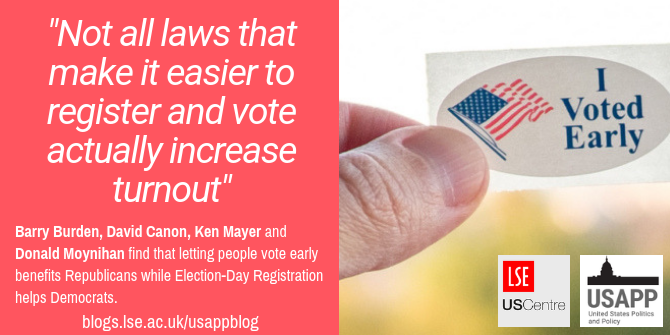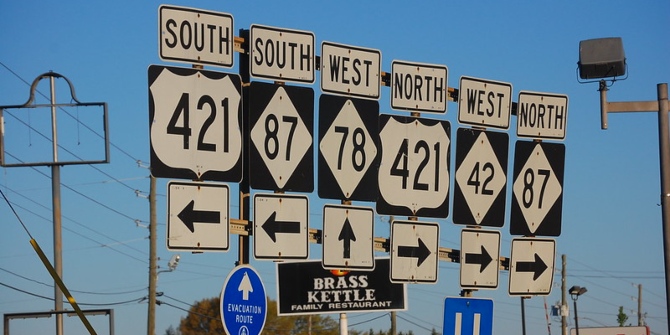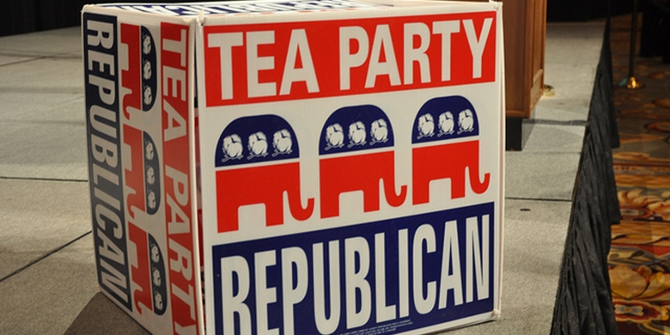


 While Republicans tend to make it harder for people to vote through initiatives such as Voter ID requirements, Democrats tend to be in favor of measures which make voting easier, such as early and Election-Day registration. But do both measures advocated by Democrats actually have an impact on turnout? Barry Burden, David Canon, Ken Mayer and Donald Moynihan have examined vote returns across three presidential elections and find that while Election-Day registration laws are better at stimulating those who are on the fence to turn out – usually Democrats, early voting measures tend to encourage those who have already decided to vote – usually Republicans.
While Republicans tend to make it harder for people to vote through initiatives such as Voter ID requirements, Democrats tend to be in favor of measures which make voting easier, such as early and Election-Day registration. But do both measures advocated by Democrats actually have an impact on turnout? Barry Burden, David Canon, Ken Mayer and Donald Moynihan have examined vote returns across three presidential elections and find that while Election-Day registration laws are better at stimulating those who are on the fence to turn out – usually Democrats, early voting measures tend to encourage those who have already decided to vote – usually Republicans.
The last US Supreme court term illustrated the importance of election law to major political disputes: Ohio was allowed to purge infrequent voters from the registration rolls; a ban on wearing political apparel in polling places was struck down; and the court punted on several hotly-anticipated redistricting cases but allowed the state of Texas to maintain district lines that a lower court had labeled discriminatory towards minority voters.
A central assumption to these cases is that partisans know how election laws affect their success, and act accordingly. Indeed, this idea is central to the broader era that Richard Hasen dubbed “the voting wars” in 2012. The election wars saw an abandonment of a largely bipartisan accord throughout most of the second half of the 20th century to find ways to expand access to vote and increase turnout. Since 2000, and especially since the Republican 2010 midterm victories, that accord collapsed. Instead, Republicans have used a variety of tools to place restrictions on voting – think voter ID requirements – while Democrats have mostly played defense, or found some wins via reforms such as automatic voter registration.
But what if partisans are imperfect assessors of their own interests? In new research, we sought to test this question, and to better understand how different election laws benefit Republicans and Democrats. To do so, we assembled datasets of county-level vote returns in the 2004, 2008, and 2012 presidential elections and model these outcomes as a function of early voting and registration laws, using both cross-sectional regression and difference-in-difference models to test the partisan effects of early voting and election-day registration (EDR) laws.
Party leaders generally assume that laws that make it easier to vote increase turnout, which in turn benefits Democrats. For example, Republicans saw Obama’s success with early voters as a key reason for his electoral success. In 2012, the Republican National Committee wrote that: “The Democrats successfully front-loaded many of their votes this cycle, expanding their early vote and absentee reach . . . They continued to expand their advantage in early voting.”
But not all laws that make it easier to register and vote actually increase turnout. To understand how local election laws work we need to account for their direct and indirect effects. Direct effects involve the immediate costs placed on potential voters, including the information, time, requirements, or effort needed to vote. Indirect effects have to do with how the law changes the behavior of other groups, such as the media, parties, campaigns, and social and political organizations, that are involved in mobilizing voters and thus underwriting the costs of participation. The direct effects are widely understood, but indirect effects are usually overlooked. This is problematic because the net effect of election laws on turnout is the combination of these two pathways.

“I Voted (Early)” by ep_jhu is licensed under CC BY NC 2.0
Election-day registration (EDR) laws work better to stimulate marginal voters who might not otherwise turn out, but early voting is more effective at retaining likely voters. Why? EDR creates an incentive for parties, candidates and social organizations to keep mobilizing potential voters until the very last day. It also removes a proven barrier to voting, which is the need to register before the election, thereby turning registering and voting from a two-step process into one-stop shopping. EDR therefore reduces both direct costs on voters, and indirect effects through other actors.
By contrast, letting people vote early provides lower direct costs by offering more convenience to those who are already-registered. But unless early voting is combined with same-day registration, it does not help those who are not yet registered. It can also undercut the indirect efforts of parties and social organizations. As more of the voting population votes early, parties and social organizations have an incentive to move their mobilization efforts elsewhere. For example, the effective cost of running an ad the day before the election in a state in which half of the votes have already been cast is twice as much as a state in which there is no early voting. With less mobilization, marginal voters who needed that extra shove to get to the polls stay home. The indirect effects of early voting are therefore negative, and may even outweigh the positive direct effects for voters who do not have an opportunity to register when voting early.
The type of voter who takes advantage of early voting – older, whiter, and wealthier – is already likely to vote, and more likely to vote Republican. Our findings confirm that early voting on its own has a negative and statistically significant effect on Democratic vote share in all three presidential elections we analyzed. The availability of early voting in isolation raises the Republican vote by about six percentage points. EDR, in contrast, helps the Democrats by a similar amount.
While partisans may not always be right about the effects of election laws, their efforts to craft laws that fit with their perceived interests creates a clear conflict that does not serve the public well. It is difficult for elected officials to have reasoned debates on the reform of election laws when they have also strong incentives to support policies that will benefit them. Partisan tinkering with election laws thus has the potential to weaken the legitimacy of election systems.
One policy implication of our work is that the design of election laws should protect against this conflict rather than be used as an instrument of partisan warfare. In the area of redistricting, for example, the state of Iowa has nonpartisan actors draw the district lines, and the legislature makes an up-or-down vote on the outcome. A similar model might be applied to other election laws, helping to increase public confidence in the outcome and reduce partisan strategizing to manipulate how the right to vote is exercised.
- This article is based on the paper, ‘The Complicated Partisan Effects of State Election Laws’, in Political Research Quarterly.
Please read our comments policy before commenting.
Note: This article gives the views of the author, and not the position of USAPP – American Politics and Policy, nor the London School of Economics.
Shortened URL for this post: http://bit.ly/2zQXhCe
About the authors
 Barry Burden – University of Wisconsin-Madison
Barry Burden – University of Wisconsin-Madison
Barry Burden is Professor of Political Science at the University of Wisconsin-Madison. His research and teaching are based in American politics, with an emphasis on electoral politics and representation. He is author of Personal Roots of Representation (Princeton University Press, 2007), co-author of Why Americans Split Their Tickets: Campaigns, Competition, and Divided Government (University of Michigan Press, 2004), editor of Uncertainty in American Politics (Cambridge University Press, 2003) and co-editor with Charles Stewart III of a forthcoming volume, The Measure of American Elections.
 David Canon – University of Wisconsin-Madison
David Canon – University of Wisconsin-Madison
David T. Canon is a professor of political science at the University of Wisconsin, Madison. He received his Ph.D. from the University of Minnesota in 1987 and previously taught at Duke University. His teaching and research interests are in American political institutions, especially Congress.
 Ken Mayer – University of Wisconsin-Madison
Ken Mayer – University of Wisconsin-Madison
Kenneth Mayer is a Professor of Political Science at the University of Wisconsin-Madison. His research interests include presidential powers, legislative redistricting, campaign finance reform, election law and administration and defense policy.
 Donald Moynihan – Georgetown University
Donald Moynihan – Georgetown University
Donald Moynihan is the McCourt Chair at the McCourt School of Public Policy at Georgetown University. His research examines the application of organization theory to public management issues such as performance, budgeting, homeland security, election administration, and employee behavior. He is the author, most recently, of Administrative Burdens: Policymaking by Other Means.







1 Comments